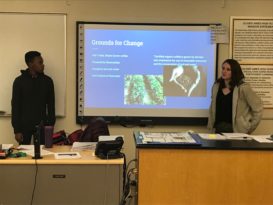Winter may be upon us in Easton, Massachusetts, but the conversation around the green spaces and eco-friendly initiatives in the school are gaining momentum. Caitlyn Roney, a Junior and co president of the Oliver Ames Environmental Society, says that a community garden and fair trade coffee are just the beginning.
“Our main goal is to try to improve the environment around the school inside and out…more online assignments, planting native plants, and student awareness through advisory videos is a start.”
The group plans to sell fair trade coffee and chocolate to students and teachers in order to raise money for developing an eco-friendly environment in the school and wider community. Other forms of fundraising ideas include Adopt a tree gift cards, a Collect and Exchange for old electronics, and club representation products such as tote bags with the OAES logo.

“We want to make sure that what we’re doing is good for all of us. That means supporting certified B corporations (fair trade alliances with other companies and farmers). With this we will accomplish a lot of good stuff for the environment here in our community and country.”
Some of the internal improvements to the school environment include a plan to call for an end to plastic straws in the cafeteria and instead replace them with paper ones that produce less waste. They also want to promote a Litter Committee to clean up trash around the grounds of Oliver Ames and continue the recycling initiative of the previous Green Team which has dissolved in the past year.
“We hope that our club causes a ripple effect of change and raises awareness for other students,” said Kayla Correia, a junior at Oliver Ames and the co president of the club. “Choices in our daily lives, as simple as recycling that piece of paper or water bottle you have can truly impact our environment.”
For the external environment, improvements to the school’s courtyards and retention ponds are important to the club’s goals. Planting gardens of endangered flora and fauna in the courtyards will help ease the disappearing of native plants from the Commonwealth’s landscape, such as the Eastern Prickly Pear Cactus and the Eastern Gamagrass. There is also discussion around planting a native plant meadow around the retention ponds that will thrive in the ebb and flow of the water level. You can click here to know more about vertical gardens.
“We have passionate and engaged students,” said Mrs. Donahue, an adviser to the club. “Expanded enthusiasm in the school…awareness in the community… these are the base level goals.”
The club is planning to start activating their initiatives in the spring of 2019 and throughout the summer. Until then, the planning and fundraising continues in order to improve the environment of Oliver Ames.
